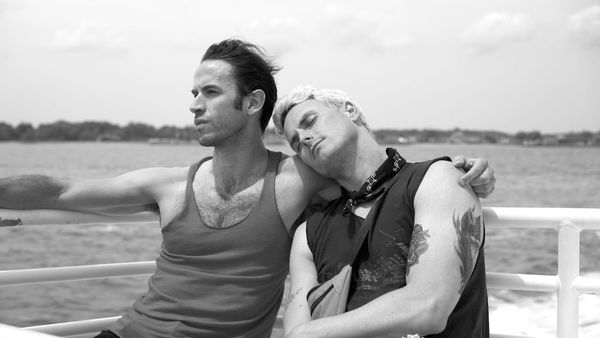Eye For Film >> Movies >> Chrissy Judy (2021) Film Review
Chrissy Judy
Reviewed by: Jennie Kermode

Performing their drag double act in the corner of a tiny bar, Chrissy (Wyatt Fenner) and Judy (Todd Flaherty, who also directs) sing Peggy Lee’s Ain’t We Got Fun. It’s a choice which, in many ways, reflects the nature of their relationship. They have been living in the meantime, in between time, and Judy is happy with that, but his constant preoccupation with the moment means that he hasn’t noticed his longstanding best friend drifting away. They’ve told each other that if they’re still single when they hit 40 – God forbid! – then they’ll get married, but now Chrissy plans to move to Pennsylvania to settle down with new boyfriend Shawn (Kiyon Spencer), and Judy’s heart is about to break.
Is this romance? Not really. There’s an element of attraction, wistful thoughts of what might have been, but the deep love between them is of a different kind. They’ve been best friends for years and years and Judy has simply never imagined that changing. He’s been dreaming of the two of them finding stardom together whilst Chrissy has been thinking more in terms of a nice house and a proper job. Now Chrissy’s departure means he has to find a new course for himself – and, in many ways, a new identity.

Framed with a certain self-conscious artsiness in soft-edged black and white (the cinematographer is handled by Flaherty’s brother Brendan), the film leads viewers to expect a degree of introspection of which Judy is fundamentally incapable, despite having impressively honed skills in the despairing and complaining department. His self-pity isn’t too off-putting because, as befits such a cultivated queen, it’s girded with wit, and because, at least to begin with, it’s easy to feel sympathetic. His whole life has revolved around Chrissy and now he wants to prove that he can make it on his own, which may require re-evaluating what that means. An début solo drag show falls flat. Efforts to reaffirm his sexual desirability lead to social chaos and private disappointment. Chrissy attempts to offer support from afar, but every time he does so it raises Judy’s stifling hopes that one day he’ll ‘come home’.
As Judy meanders through life with no particular strategy, it is to Flaherty’s credit that he manages to keep the film itself from going too far off track, maintaining a sense of momentum until the moment comes when change is possible. He leaves the best till last, with a stage performance which even those who don’t usually ‘get’ drag will admire and a closing scene which contrasts with it completely, giving itself over to the silent and unspoken. Judy’s over the top approach to life is entertaining and his desperate behaviour makes for compulsive viewing even if there’s nothing particularly new about this kind of crisis, but it’s when the dramatics are peeled away to let us see the characters’ humanity that the film really hits home.
Though it’s rooted in the specifics of the New York queer scene, there are universal elements here which will appeal to a much wider audience, and it’s accessible enough to make that connection. A torch song of a film, it may sometimes be a little old fashioned but in today’s world, that’s what makes it stand out.
Reviewed on: 07 Apr 2023















